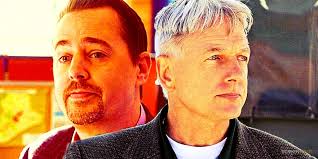
Side by Side in Extreme Prejudice: Gibbs and McGee Unshaken
The world of NCIS is a relentless crucible, a place where the shadows of malice perpetually threaten to engulf the light of justice. Within this grim landscape, where human depravity often reaches its zenith, certain partnerships emerge not merely as functional units but as fortresses against the storm. Among these, the enduring, evolving bond between Leroy Jethro Gibbs and Timothy McGee stands as a singular testament to steadfastness. Side by side, they confront extreme prejudice – not just the overt violence of criminals, but the insidious biases, the moral ambiguities, and the psychological warfare that defines their profession – yet remain, uncannily, unshaken.
"Extreme prejudice" in their context is a multi-faceted hydra. It is the raw, visceral hatred of a terrorist, the calculated deceit of a traitor within their own ranks, or the chilling indifference of a bureaucratic machine that threatens to stifle truth. But it is also the subtle, corrosive prejudice against their methods, their unconventional approaches, and at times, their very humanity. Gibbs, the enigmatic bedrock, often faces this as a solitary figure, his gut instincts and silent judgments frequently clashing with conventional protocols. McGee, the cerebral analyst, initially confronts it as the perpetually underestimated “Probie,” his intelligence dismissed by those who equate quiet brilliance with weakness. Together, however, they present a united front, an unspoken pact of mutual reliance that becomes their shield.
Gibbs’s unshakable nature is legendary, almost mythical. It is a granite foundation built on years of unspeakable loss and unwavering conviction. He faces down psychopaths with an unflinching gaze, navigates political minefields with silent disdain, and absorbs personal attacks with a stoicism that borders on the superhuman. This isn't a lack of emotion, but a profound discipline born of necessity. His resilience is the anchor, the point of absolute moral clarity in a turbulent sea. When the truth is obscured by lies, when the path forward is fraught with danger, Gibbs doesn't waver. He simply stares the prejudice down, his silence often more potent than any roar, his actions a testament to an unyielding moral compass. He is the immovable object against every irresistible force, his steadfastness a bedrock for the entire team.
McGee, by contrast, embodies an evolution of unshakable resolve. He began as a character defined by his intellect and a certain nervous energy, a digital native adrift in Gibbs’s analog world. The prejudice he faced was often subtle: the condescension of suspects, the occasional dismissiveness of colleagues, and the internal struggle to reconcile his meticulous logic with the chaotic reality of crime. Yet, under Gibbs’s tutelage – expressed through head-slaps, curt commands, and profound, unspoken trust – McGee forged his own unique form of resilience. He learned to trust his instincts, to navigate the murky waters of human psychology, and crucially, to stand firm in his convictions, even when his brilliance made him a target. His unshakable quality isn’t born of stoicism but of an intellectual and ethical clarity, a determination to follow the data and the truth wherever it leads, regardless of the personal cost.
The true marvel lies in their "side by side" dynamic. It’s not just two individuals independently strong; it’s a symbiotic relationship that amplifies their individual strengths and shores up their vulnerabilities. Gibbs relies on McGee's digital prowess to unearth secrets hidden in the ether, to give form to the invisible threads of a conspiracy. McGee, in turn, draws strength from Gibbs’s unwavering presence, his implicit trust, and the quiet lessons of leadership. When Gibbs charges into a hostile environment, McGee is often there, providing overwatch, tactical support, or critical intelligence from the field, their eyes meeting in a moment of shared understanding that transcends words. Their partnership is an alchemy: Gibbs's gut instinct combined with McGee's analytical precision, creating a two-man bulwark against the forces of chaos.
Whether confronting a global terrorist cell, navigating a labyrinth of political corruption, or piecing together the fractured remains of a shattered life, Gibbs and McGee move with a quiet, synchronized determination. The extreme prejudice they face—the accusations, the threats, the sheer weight of human suffering—could easily break lesser individuals. Yet, they absorb it. They process it. They channel it into relentless pursuit of justice. Their gazes, though sometimes weary, never waver from the truth. Their hands, though sometimes stained, never falter in their mission.
In the final analysis, the image of Gibbs and McGee, side by side, unshaken in the face of extreme prejudice, is more than just a depiction of a fictional partnership. It is an illustration of an ideal: the enduring power of integrity, the quiet strength of conviction, and the profound resilience forged in the fires of shared purpose. They stand as a testament to the belief that even when the world is at its most ugly, and injustice looms largest, two individuals, bound by trust and principle, can face the tempest and, together, remain gloriously, stubbornly, unshaken.